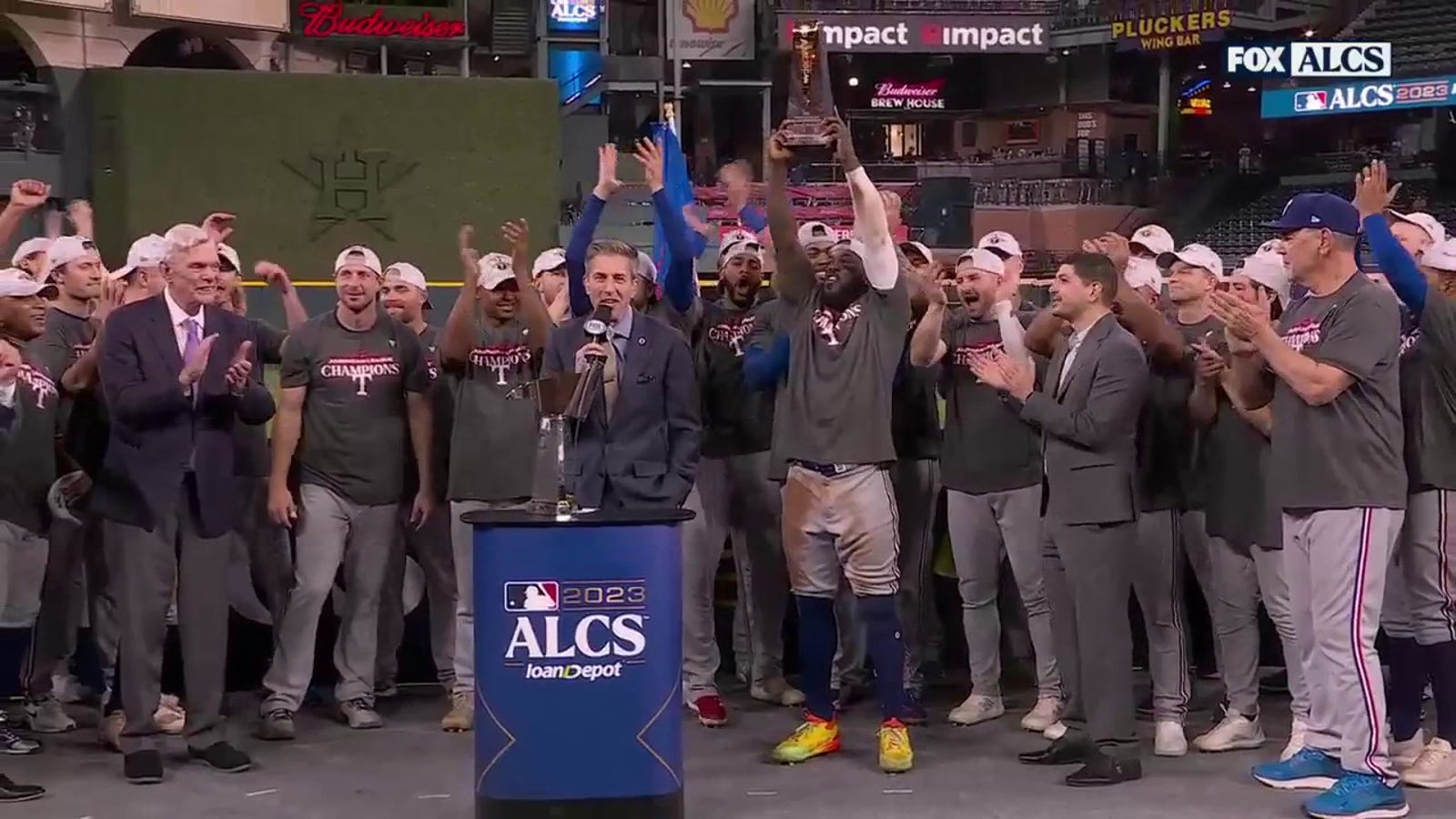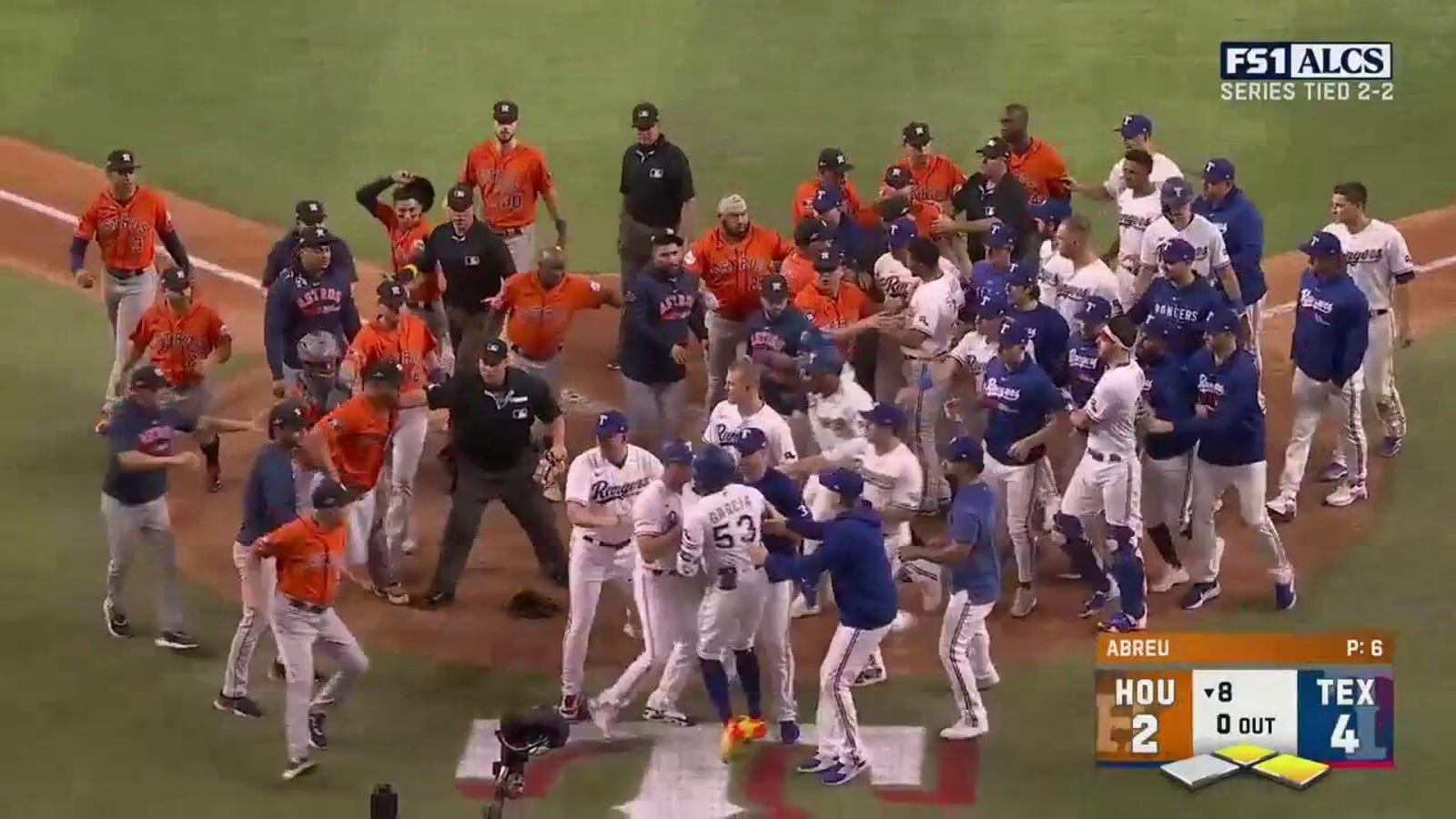
Adolis García's struggle, resilience and success embody that of the Rangers
ARLINGTON, Texas — Two years ago, the Rangers lost 102 games. That was the third-most in baseball and marked the club’s lowest point since 1973. Last year, Texas won 68 games and finished 38 games out of first place. This week, the wild-card underdog rallied to eliminate baseball's defending champions on their own field and will play for the first World Series title in franchise history.
Results mean nothing without the process, however.
Just ask Texas' budding star outfielder Adolis García. The American League Championship Series MVP is coming off a performance for the ages. But just like with his ballclub, to begin telling his story here would be completely burying the meaning in it.
"More than anything, it's not even about beating the Astros or that particular opponent," García said after Monday's Game 7. "It's how proud I feel about the journey we've been on and how we've been able to improve to get to this point right now where we're celebrating this victory."
The Cuba native views his personal journey in a similar light.
For five-plus years, he played for Ciego de Ávila in the Cuban National Series. With his father and his older brother, Adonis, having played professional baseball, García, too, wanted the sport to be a mainstay in his life. The first step in achieving his dream of reaching the big leagues was to circumvent the Cuban government by requesting to play in Japan. After spending a season with the Yomiuri Giants, García defected from Cuba by establishing residency in the Dominican Republic. Soon, he became an international free agent. In 2017, the Cardinals signed him for $2.5 million.
García had finally made it, or so he thought.
Despite raking in both Double- and Triple-A, the Cards gave him just 17 plate appearances in the majors over three years. In December 2019, they designated him for assignment and then traded him to the Rangers for cash. As a minor-leaguer, his 2020 campaign was lost to the pandemic, with Texas sticking him at its alternate site after a cup of coffee in the majors. The following spring, the Rangers designated García for assignment to create a roster spot for journeyman pitcher Mike Foltynewicz.
This time, García went unclaimed and was fortunate to get a spring training invite from the Rangers. He was now 28 years old.
After not making the club's Opening Day roster, García was called up two weeks into the season as an injury replacement. It was the opportunity he'd been fighting for, for a decade — and he immediately captured it. In his first full month in the big leagues, García recorded 11 homers and a .633 slugging percentage to earn AL Rookie of the Month honors. Two months later, he was an All-Star replacement. He'd finish the season with 31 homers and fourth in American League Rookie of the Year voting. (Foltynewicz, whose acquisition initially nudged García out of the organization, went 2-12 with a 5.44 ERA for Texas in what would be the last season of his MLB career.)
In 2022, García improved his OPS+ by 12 points and ranked third in the majors in Bill James' power/speed metric. This year, he was an All-Star starter while making an 11-point leap in OPS+ and cranking 39 homers. But when asked to reflect on his incredible rise, García can't help but recount his roots.
"It really means a lot," García said of his baseball journey. "Personally, I know the struggle that I went through. The struggles that we go through when we're trying to leave, play outside baseball. And I know everything I had to go through and the struggle just to get where I am today, so I'm really grateful for that."
For some, such humility probably runs counter to the bold, fearless and feisty ballplayer we see on the field. Off it, García is known for being quiet and cerebral. Though he's been open about his voyage, he's kept significant portions of his adversity to himself and those that know him best. Publicly, he chooses to focus on positive attributes, like self-confidence and being a source of encouragement for his teammates.
"He works extremely hard," Marcus Semien said. "His bat is just so good right now. It's dangerous. I just want to get on base for the guy."
That objective continues Friday when the Rangers host the Diamondbacks in Game 1 of the World Series (8:03 p.m. ET on FOX and the FOX Sports app), where García can become a household name. He's already the biggest bargain competing in the Fall Classic.
Given the winding road he traveled to the big leagues and his late-bloomer status, García's earning a mere $747,760 for his face of the franchise services. He could earn more than half of that in postseason bonuses if Texas were to win the World Series. Another payday is also coming after the season, as García is finally eligible for arbitration.
But the man they call El Bombi still has business to attend to in the ballpark.
Moments after the Cuban slugger helped the Rangers take down the defending champions this past week, the Astros' Wikipedia page was briefly edited to reflect García as the club's principal owner. The prank didn't completely lack validity. García, in his first career postseason, clubbed five home runs versus Houston and set the record for most RBIs in a playoff series with 15. His grand slam in Game 6 sealed a Rangers rout and his two homers in Game 7 punctuated their stunning series comeback at Minute Maid Park. Through it all, he laughed, he persevered, he put his hand to his ear, wanting to hear more from those already screaming his name.
The ALCS was the full Adolis García experience. Semien declared that García is the most confident player he's met in baseball. Of course, with a player this impactful, and this indomitable, he didn't conquer without drama.
Had Texas lost, traditionalists would still be dissecting every millisecond of García inciting a benches-clearing fracas or him not hustling on an RBI single that he thought was a home run.
The theatrics began in Game 5, two innings after he launched a three-run home run to give the Rangers a 4-2 lead. In the eighth, after he was hit by a Bryan Abreu fastball, García instantly jawed at catcher Martín Maldonado and acted as the aggressor as both benches poured onto the field. If García simply takes first base, the game continues.
Maybe then, Texas closer Jose Leclerc doesn't get cold and surrender a go-ahead three-run home run to José Altuve. Maybe the Rangers win that night.
"I don't have anything personal with anyone," García asserted afterward. "My thing is just to go out there and play baseball."
Naturally, he was greeted with a barrage of boos for Game 6 in Houston. From lineup introductions through his four ensuing strikeouts, García heard it all night long.
Somewhere along the way, that crowd reaction fueled him. Maldonado had said all García did was wake up the Astros. If so, the lullaby of the crack of his bat would put them back to sleep. In the ninth inning, García parked a fastball from Ryne Stanek into the Crawford Boxes for a grand slam, giving the Rangers a commanding 9-2 lead to tie the series.
"If there's one guy I want to play in hostile conditions, it's 'Doli," Texas designated hitter/catcher Mitch Garver said.
While it became easy to label García as a hothead, how he responds to his errors warrant just as much attention. García showed resolve, maybe even growth, when he chose not to speak to reporters after his redeeming blast in Game 6. That was unlike García, who is typically open to chat with the media whenever there's a request. Those who have covered him closely since he joined the Rangers in 2020 could remember the slugger declining interviews only one other time, also after an emotional game.
"I was just focused solely on Game 7," said García, filling in the mystery of why he stayed mum. "And honestly, I didn't want to say something or do anything that would get me off track from being able to perform."
And perform he did. Monday night's series finale opened with another infamous bang, as García roped a ball off Minute Maid Park's left-field wall in the first inning and then paused for nearly five seconds while holding his bat to admire his work: a 346-foot single. He stole second on the very next pitch. In his next at-bat, he homered. Then he singled. Then he homered again.
That, too, is superstar behavior.
García might be 30 years old, but he's still maturing, he's still learning, he's still discovering in this epic journey of his. And this October, he's experienced all of that while on the biggest stage of his career. It's just as easy to marvel at his magnificence as it is to hate his histrionics. But to stop at either would be missing out on what makes García special, on the perseverance and determination that got him through Cuba, though Japan, through the Dominican Republic, and through his rocky road in and out of the minors.
That's why his passion, why his pure joy for the game are so palpable. It also could explain teammate Corey Seager, notoriously one of the least expressive players in the game, endearingly calling García "a bad man" and "fun to watch" in the aftermath of Texas' ALCS Game 7 triumph.
So, let's enjoy the show. We know for sure that García's not going to quit. Even better, he might just be getting started.
Deesha Thosar is an MLB writer for FOX Sports. She previously covered the Mets as a beat reporter for the New York Daily News. The daughter of Indian immigrants, Deesha grew up on Long Island and now lives in Queens. Follow her on Twitter at @DeeshaThosar.










